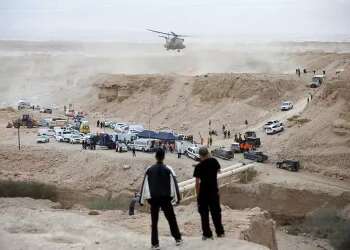1
A people emerged from Egypt, just born from the womb of the world's greatest empire, on its way to eternal freedom. Unlike the histories of other nations, although it had not yet received its constitution and its homeland was distant, it was already a people. And only for that reason could it receive the Torah. Individuals before them may have been righteous, enlightened and moral, but only a people can receive a Torah, meaning to establish a civilization. A people includes all types, according to the Vilna Gaon, the word tzibur (community) is an acronym for tzaddikim, beinonim and resha'im (the righteous, the average, and the wicked), and only by virtue of being such can it demand and receive the Torah.
In his recollections after 40 years of wandering, Moses reminded the people of the foundational principle of our nationhood: "Has God ever attempted to go and take for Himself a nation from the midst of another nation… as the Lord your God did for you in Egypt…?" (Deuteronomy 4:34) According to the Bible, the story of our national founding is the story of our birth as a people from the very innards or womb of the greatest nation on Earth. The midwife is none other than God Himself. Our birth as a nation is thus stamped with the seal of eternity and is not dependent on the changing conditions that have caused other peoples to disappear.
2
In the mid-19th century, Rabbi Nachman Krochmal (1785-1840), in his book Guide for the Perplexed of Our Time, attempted to answer the mystery of our endurance. The uniqueness of a nation, he argued, lies in what he called a "spiritual portion," or the "spirit of the nation" in ancient terminology. This is the founding spiritual element expressed in the nation's life, culture, laws, customs and religion. A nation's peak is marked by the full expression of this spiritual portion - its mission or creation - after which the nation's historical role ends and it makes way for others.
The nations of the world, he said, adhered to a "partial spirituality" - their nationalism was rooted in a partial spiritual foundation, and thus their existence was limited in time. By contrast, the people of Israel adhered to the "absolute spirituality," one that transcends material phenomena and partial expressions of the spirit. God is the ultimate spiritual force, and monotheism expresses the longing for the level of this spiritual ideal.
Therefore, even if on the worldly level the people of Israel go through phases of growth and decline like other nations, their adherence to absolute spirituality ensures eternal spring. This is why they never complete their historical mission, their purpose is eternal, and their spiritual portion never exhausted. When the time comes, they can be renewed after destruction and begin a new cycle of life.
3
The founding myths of nations throughout history describe groups that gradually coalesce in a specific geographical region, usually through war, until they become a people. Over time, these nations wither, collapse and go into exile, eventually assimilating and vanishing from history. Our nationalism is different. We were forged into a people in the desert around an idea, and only then entered the Promised Land. Therefore, when we were exiled after the destruction of the Temples, we did not disappear, because the seed that made us a people remained alive. In this sense, Judaism is not just a religion but a civilization: a nation, a faith, a culture, a philosophy, a legal system, literature, prophecy and science. It can survive without a land, but only in our ancient homeland can we fully realize our spiritual and cultural potential as a people.
Life without a land is life on the edge, a precarious existence rooted in air without the grounding source below. Returning to the land is not only a return to places of the past; It is a revival of the national spirit that lay dormant during our exile.
4
The essence of religion worldwide is typically the relationship between the individual and God. But in our case, the spiritual demand in Judaism is linked to the relationship between the public, or the people, in front of God. Every ritual or blessing is phrased in the plural: "who has sanctified us… and commanded us," and so forth. Divine service is also divided among different groups within the people: men and women, priests and Levites, military and governmental personnel, and others. Only the nation as a whole can uphold the entirety of the Torah, not individuals.
In Egypt, God first addressed us as a people and gave a commandment: "The Lord said to Moses and Aaron in Egypt: This month shall be for you the beginning of months; it is the first of the months of the year for you" (Exodus 12:1-2). Our first commandment as a people was not a religious obligation per se, but the sanctification of the months, which determines the Hebrew calendar. We count months according to the lunar year. The word "chodesh" (month from the Hbrew root Chadash, i.e. new) thus relates to the moon, which disappears and is renewed. The sun, in contrast, is fixed and unchanging. Still, the month of our Exodus is also called the "month of spring" (in Hebrew: aviv) - meaning the month in which the barley ripens (literaly: aviv) - and we must ensure that the first month always falls during this season. Thus we take into consideration also the solar year and must balance between both systems).
5
The fact that our first commandment was the sanctification of the new month shows that our entry into history as a nation is bound up with our existence in time. Humanity's greatest enemy is time, when it ends, life ends. But at the moment we became a nation, we received the key to time: the ability to sanctify time or remove its sanctity through havdalah. Poetically, one might say that we transform the temporary and fleeting into the eternal. In other words, we dominate time, it does not dominate us. This declaration has stood the test of time. While nations and empires have dissolved into the fog of history, we have remained alive and enduring for thousands of years, a reality that explains the phrase "the people of Israel lives." Even if the individuals within the people pass on, the nation remains.
6
In biblical times, there were two holidays: Passover and the Festival of Matzot. The first commemorated our rescue during the Plague of the Firstborn. A we recite in the Haggadah: "The Passover sacrifice that our ancestors ate in Temple times, why did they eat it? Because God passed over our ancestors' houses in Egypt, as it says: 'You shall say: It is the Passover sacrifice to the Lord, who passed over the houses of the Israelites in Egypt when He struck the Egyptians and spared our homes…' (Exodus 12:27)". The second, the Festival of Matzot, marked the Exodus from Egypt. Once the Paschal offering ceased, the two holidays merged, and matzah assumed a role akin to that of the Passover sacrifice.
The Haggadah continues: "This matzah that we eat, why do we eat it? Because the dough of our ancestors did not have time to rise before the King of Kings, the Holy One, Blessed Be He, appeared to them and redeemed them. As it says: 'They baked the dough they brought out of Egypt into matzah cakes, because it did not rise; for they were driven out of Egypt and could not delay, and they had prepared no provisions for themselves' (Exodus 12:39)." The special bread of Passover exists outside ordinary time, which is required for dough to rise.
As the Maharal of Prague (Rabbi Judah Loew ben Bezalel, 1512-1609) wrote in the 16th century: "Therefore leaven is forbidden, for it results from a time lapse… The entire essence of the redemption was that the dough of our ancestors did not rise. From this you see that the redemption was beyond the progression of time… because Israel departed in a state of divine holiness to which time does not apply." In other words, our nationalism (our Exodus, which was our birth as a people) does not belong to time but to another dimension of eternity.
Passover made us an eternal people from the very moment of our birth. Therefore, we must view current events not only in terms of the present, but also from the perspective of eternity. The freedom illuminated by the holiday is an invitation to personal and national renewal. In Hebrew, to miss is "lehachmitz", from the word "hametz", leaven. So let us not miss the moment.




